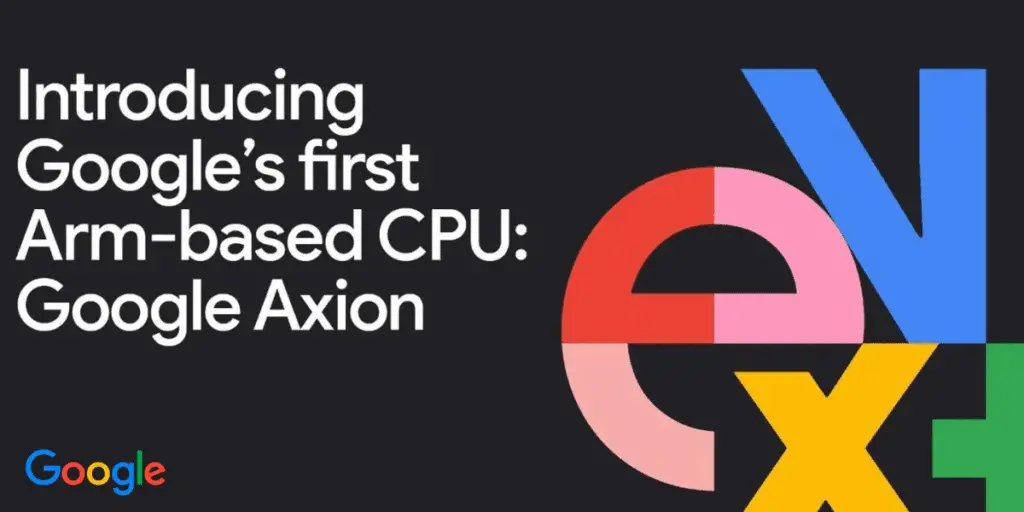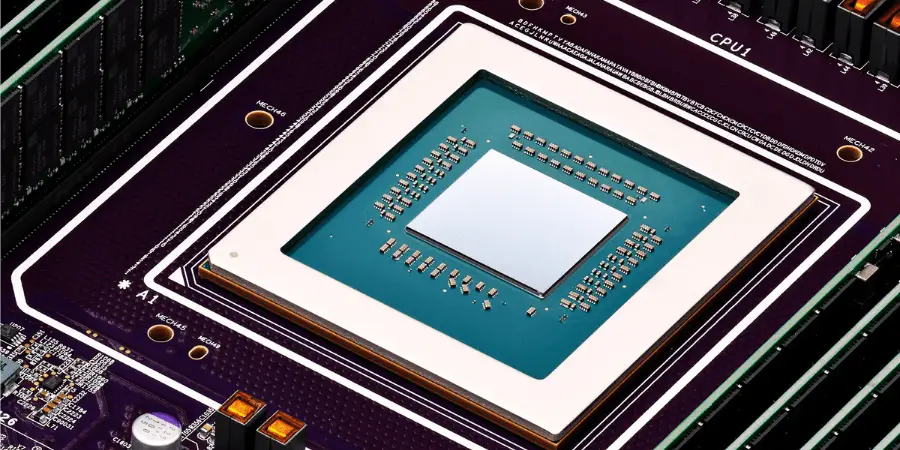Google has recently lifted the veil on its pioneering ARM-based processor, dubbed “Axion,” aimed at revolutionizing the efficiency and performance of its data centers.
This announcement, made with much fanfare at the Cloud Next conference in Las Vegas, marks Google’s foray into a domain previously ventured into by tech behemoths like Amazon, Alibaba, and Microsoft.
These companies have embarked on a similar journey, developing their proprietary server processors to diminish reliance on traditional microprocessor giants such as Intel and Nvidia.
Google’s introduction of Axion not only signals a significant technological leap but also underscores the intensifying competition in the cloud infrastructure market.
With the Axion chip, Google aspires to set a new benchmark for data center performance, leveraging ARM’s advanced Nanovers V2 technology to achieve unprecedented levels of efficiency and processing power.
This move is a testament to Google’s engineering prowess and strategic vision in a landscape where control over hardware is increasingly synonymous with competitive advantage.
As we delve deeper into the details of the Axion chip and its implications for Google and the broader tech industry, it becomes clear that this is not merely an incremental step but a giant leap forward in the evolution of cloud computing.
Background
The trajectory of ARM technology in the tech industry has been nothing short of revolutionary. ARM Holdings, a British semiconductor and software design company, has established itself as a linchpin in the realm of chip architecture, licensing its designs to a myriad of companies.
These companies span from mobile device giants like Apple and Qualcomm to emerging players in various technology sectors.
ARM’s designs are renowned for their energy efficiency and performance, traits that have led to their dominance in the mobile market—powering nearly 99% of premium smartphones worldwide.
Google’s engagement with ARM technology is far from its inception with the Axion chip. The tech behemoth has a rich history of exploring and innovating with ARM-based designs, a journey underscored by the development of the Tensor chip.
This custom-designed processor, which currently powers Google’s Pixel smartphones, is a testament to Google’s commitment to leveraging ARM’s architecture.
The Tensor chip, with its focus on enhancing AI capabilities—from improving images and videos to optimizing search and text-to-speech functions—illustrates Google’s ambition to not only participate in but also shape the future of ARM technology.
The decision to develop and unveil the Axion chip for data centers continues Google’s strategic exploration of ARM-based solutions. This move aligns with a broader industry trend in which tech giants are increasingly inclined to develop custom chips.
This trend is driven by the desire to reduce dependency on conventional chip manufacturers and achieve greater control over the performance, efficiency, and capabilities of the hardware powering their services and infrastructure.
As Google unveils the Axion chip, it’s clear that the company is building on a foundation of extensive experience with ARM designs.

With the Axion chip, Google aims to bring the benefits of ARM’s architecture—efficiency, performance, and customization—to the heart of its cloud computing operations.
This strategic decision not only reflects Google’s long-term vision for its hardware and services but also its role as a vanguard in the tech industry’s shift towards custom silicon solutions.
Axion Chip Breaking New Ground
Google’s Axion chip represents a significant technological advancement in the realm of data center processors, setting new benchmarks for performance, efficiency, and energy consumption.
Built on ARM’s cutting-edge Nanovers V2 technology, Axion is designed to cater to the rigorous demands of modern data centers, offering a compelling alternative to the traditional x86 architecture predominantly used in cloud computing environments.
The Axion chip distinguishes itself through remarkable improvements in performance and efficiency. Google claims a 30% performance enhancement over the fastest general-purpose ARM-based virtual machines currently available in the cloud.
This leap is not merely incremental; it’s transformative, enabling more efficient processing of vast amounts of data at significantly reduced energy costs.
Compared to comparable VMs based on the x86 architecture, Axion boasts up to 50% better performance and up to 60% improved energy efficiency.
These advancements are pivotal, particularly in an era when data centers are increasingly scrutinized for their environmental impact and operational costs.
One of the most compelling aspects of the Axion chip is its versatility. Designed to support a wide range of workloads, from web serving and data analytics to containerized applications and databases, Axion is positioned as a one-size-fits-all solution for data center operations.
This flexibility is crucial for a technology landscape that demands adaptability and efficiency, catering to the ever-evolving needs of businesses and consumers alike.
Google’s deployment strategy for the Axion chip underscores its commitment to leveraging this technology across its services.
The chip is already powering critical Google services such as the YouTube ads platform, Google Earth Engine, and other vital infrastructure components like BigTable, Spanner, BigQuery, Blobstore, and Pub/Sub.
This broad application spectrum not only demonstrates Axion’s capabilities but also serves as a testament to its reliability and performance.
Looking ahead, Google plans to extend Axion’s reach to its business customers on Google Cloud “later this year,” a move that signals the company’s confidence in the chip’s capabilities and potential to reshape the cloud computing landscape.
The unveiling of the Axion chip is a strategic play in the competitive cloud infrastructure market. With cloud computing becoming increasingly central to business operations across industries, the efficiency and performance of data centers have become critical competitive differentiators.
By developing the Axion chip, Google is not just enhancing its infrastructure; it’s challenging the status quo, setting new standards for what’s possible in cloud computing, and further solidifying its position as a leader in the technology industry.
Applications and Impact
The introduction of Google’s Axion chip into the realm of data center computing is poised to have a broad and significant impact, not only within Google’s ecosystem but across the entire cloud computing industry.
By harnessing the power and efficiency of the Axion chip, Google is setting new standards for performance, energy efficiency, and versatility in data center operations.
The immediate beneficiary of the Axion chip’s capabilities is Google’s array of services. From the YouTube ads platform to the Google Earth Engine and critical data infrastructure components like BigTable, Spanner, BigQuery, Blobstore, and Pub/Sub, the Axion chip is already proving its worth.
The chip’s deployment across these services indicates a significant enhancement in processing speed and efficiency, which translates to improved user experiences and more robust data handling capabilities.
The efficiency gains in energy use and the increased processing power can lead to faster query responses in BigQuery and more efficient data storage solutions in Blobstore, directly impacting the productivity and operational efficiency of businesses relying on these services.
Looking beyond Google’s internal operations, the strategic plan to roll out the Axion chip to Google Cloud business customers “later this year” stands as a testament to the chip’s robustness and Google’s confidence in its performance.
This move is poised to democratize access to high-efficiency, high-performance computing resources, enabling businesses of all sizes to leverage the same advanced technology that powers Google’s own services.
For industries reliant on heavy computational tasks, such as data analytics, machine learning, and large-scale web applications, the Axion chip could offer a competitive edge, providing more computing power per dollar and reducing operational costs through improved energy efficiency.
The environmental impact of data centers has been a growing concern, with their energy consumption and heat generation under increasing scrutiny. The Axion chip’s emphasis on energy efficiency addresses this concern head-on, offering a pathway to more sustainable data center operations.
By reducing the energy footprint of its data centers, Google not only lowers its operational costs but also sets an industry standard for environmental responsibility in the tech sector.

The introduction of the Axion chip is likely to spur innovation within the cloud computing industry. As other companies seek to compete or collaborate with Google, the push for more efficient, powerful, and versatile processors could accelerate, leading to a new era of cloud computing technology.
The launch of the Axion chip marks Google’s entry into a select group of tech giants that have developed their custom server processors. This move could have significant implications for the competitive dynamics of the cloud infrastructure market.
With Google offering a potent combination of performance, efficiency, and versatility, competitors may be forced to accelerate their innovation cycles or seek new partnerships to keep pace.
This could lead to a more vibrant and diverse ecosystem of cloud computing solutions, ultimately benefiting end users through more choices and better services.
Market Implications
The unveiling of Google’s custom ARM-based Axion chip for data centers signifies a pivotal moment in the cloud computing and semiconductor industries, with profound implications for their market dynamics.
As Google embarks on this strategic initiative, the ripple effects extend beyond its own cloud services, influencing competitors, suppliers, and the broader market landscape.
Traditionally dominated by Intel and Nvidia, especially in the data center and cloud computing segments, the semiconductor industry is witnessing a significant shift towards custom ARM-based solutions.
Google’s Axion chip, built on ARM’s Nanovers V2 technology, exemplifies this trend, highlighting the increasing preference for ARM architectures due to their energy efficiency and performance advantages.
This shift could alter the competitive landscape, challenging the market dominance of traditional chip manufacturers and potentially leading to a diversification of supply chains and partnerships within the industry.
Google’s foray into custom processors with the Axion chip is a strategic move to bolster its cloud computing business. Despite being a major player, Google Cloud holds a smaller market share compared to giants like Amazon Web Services and Microsoft Azure.
The deployment of Axion chips could enhance the performance and cost-efficiency of Google Cloud services, making them more attractive to potential customers. This technological edge could help Google gain ground in the fiercely competitive cloud market, where performance and efficiency are key differentiators.
The increased efficiency and performance of Google’s data centers powered by Axion chips may lead to more competitive pricing structures and innovative service offerings in the cloud computing market.
As data centers become more energy-efficient and powerful, cloud service providers can offer more computing power at lower costs, potentially passing these savings on to customers.
This could spur a wave of innovation in cloud services, with providers differentiating themselves through unique features or specialized capabilities powered by custom silicon.
Google’s investment in custom ARM-based processors is likely to spur further innovation across the cloud computing and semiconductor industries.
Competitors may accelerate their own custom silicon projects to keep pace with Google, leading to a new era of innovation in data center technology. This could benefit consumers and businesses alike, with advancements in cloud computing technology leading to more powerful, efficient, and cost-effective cloud services.

While the introduction of the Axion chip presents significant opportunities, it also poses challenges. Integrating custom silicon into existing infrastructure requires substantial investment in development, testing, and support.
Google’s shift towards custom processors could impact its relationships with traditional chip suppliers. It may necessitate adjustments in its supply chain strategy. These challenges highlight the complex dynamics at play as companies navigate the transition to custom silicon solutions.
Final Thoughts
The unveiling of Google’s Axion chip marks a watershed moment in cloud computing and semiconductor design, heralding a new era in which custom silicon becomes a key driver of innovation, performance, and efficiency.
This strategic move by Google is not merely about enhancing the capabilities of its data centers. Still, it signals a broader shift in the technology landscape towards greater customization and optimization of computing resources.
The Axion chip’s introduction is indicative of an industry-wide trend towards ARM-based architectures and custom processors, challenging the status quo dominated by traditional x86 architectures and manufacturers.
This shift promises not only to redefine performance benchmarks and energy efficiency standards but also to catalyze further innovation in cloud services, making advanced computing power more accessible and cost-effective for businesses and end-users alike.
By developing the Axion chip, Google is poised to significantly enhance the attractiveness of its cloud offerings, potentially increasing its market share in the highly competitive cloud infrastructure market.
This move underscores Google’s commitment to leveraging cutting-edge technology to deliver unparalleled service quality and efficiency, setting a new benchmark for what is possible in cloud computing. The focus on energy efficiency with the Axion chip aligns with a growing emphasis on sustainability within the tech industry.
By reducing the energy footprint of data centers, Google not only addresses environmental concerns but also reduces operational costs, showcasing a path forward for the industry to balance technological advancement with ecological responsibility.
Google’s Axion chip serves as a harbinger of future innovations in the tech sector, where custom silicon could become commonplace, offering tailored solutions to meet the diverse needs of cloud computing workloads.
This development is likely to inspire other tech giants and startups alike to explore custom processors, fostering a new wave of technological advancements and applications.


